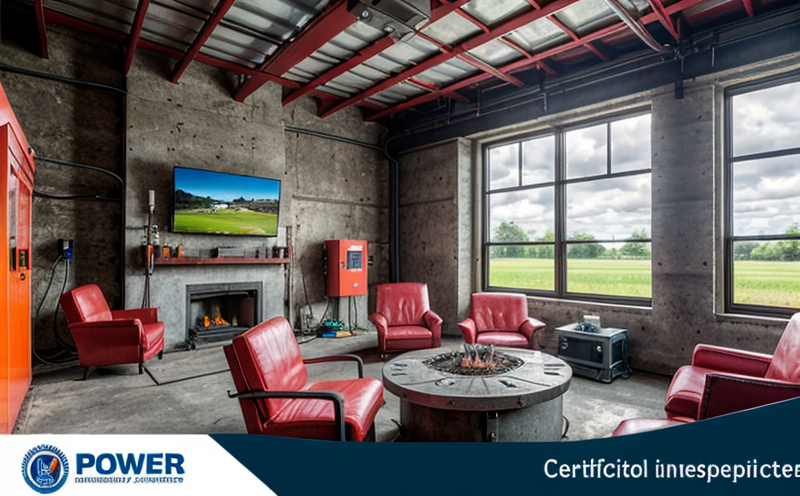
-
Industrial Equipment Certification-
Industrial Equipment Performance and Efficiency-
Certification for Power Usage Effectiveness in Industrial Equipment
We provide comprehensive solutions designed to help our clients mitigate risks, enhance performance, and excel in key areas such as quality, health & safety, environmental sustainability, and social responsibility.
Discover
For many years, our organization has been operating successfully, boasting modern laboratories that meet international standards. These laboratories are equipped with the latest technology devices and equipment, and we have built a strong team of experienced and trained personnel to operate them.
DiscoverWelcome to Eurolab, your partner in pioneering solutions that encompass every facet of life. We are committed to delivering comprehensive Assurance, Testing, Inspection, and Certification services, empowering our global clientele with the ultimate confidence in their products and processes.
Discover
-
Industrial Equipment Certification-
Industrial Equipment Performance and Efficiency-
Certification for Power Usage Effectiveness in Industrial EquipmentCertification for Power Usage Effectiveness in Industrial Equipment
The worlds growing concern about energy efficiency has led to the development of various certification programs aimed at promoting sustainable practices in industrial equipment. One such program is the Certification for Power Usage Effectiveness (PUE), which helps industries assess and improve their power usage efficiency. In this article, we will delve into the concept of PUE certification, its benefits, and the process involved in obtaining it.
What is PUE Certification?
PUE certification evaluates the energy consumption patterns of industrial equipment, such as machines, motors, and other devices used in various industries like manufacturing, oil and gas, and pharmaceuticals. It assesses the efficiency of these equipment based on various parameters, including energy consumption, power factor correction, and harmonic distortion.
The primary goal of PUE certification is to ensure that industrial equipment consumes electricity efficiently, reducing waste and minimizing the environmental impact associated with power usage. By implementing PUE certified equipment, industries can enjoy significant benefits such as reduced energy costs, increased productivity, and enhanced brand reputation due to their commitment to sustainability.
Benefits of PUE Certification
The adoption of PUE certification has numerous advantages for industrial equipment manufacturers, owners, and operators. Some of the key benefits include:
Power factor is the ratio of real power to apparent power in an AC circuit.
A high power factor indicates efficient energy usage, while a low power factor suggests energy waste.
Manufacturers can improve power factor by using devices that correct for harmonics and reduce reactive power.
Harmonic distortion occurs when non-sinusoidal current flows in an AC circuit, leading to energy waste and potential equipment damage.
Manufacturers can minimize harmonic distortion by designing equipment with built-in filters or using active power factor correction devices.
Detailed Explanation of PUE Certification Requirements
Heres a detailed explanation of the requirements for obtaining PUE certification:

Environmental Simulation Testing
Environmental Simulation Testing: A Comprehensive Guide In todays world, where technology is rapidl...

IT and Data Center Certification
IT and Data Center Certification: Understanding the Importance and Benefits The field of Informatio...

Environmental Impact Assessment
Environmental Impact Assessment: A Comprehensive Guide Environmental Impact Assessment (EIA) is a c...

Industrial Equipment Certification
Industrial equipment certification is a critical process that ensures industrial equipment meets spe...

Agricultural Equipment Certification
Agricultural equipment certification is a process that ensures agricultural machinery meets specific...

Healthcare and Medical Devices
The Evolution of Healthcare and Medical Devices: Trends, Innovations, and Challenges The healthcare...

Energy and Sustainability Standards
In today’s rapidly evolving world, businesses face increasing pressure to meet global energy a...

Construction and Engineering Compliance
Construction and Engineering Compliance: Ensuring Safety, Quality, and Regulatory Adherence In the ...

Consumer Product Safety
Consumer Product Safety: Protecting Consumers from Harmful Products As a consumer, you have the rig...

Renewable Energy Testing and Standards
Renewable Energy Testing and Standards: Ensuring a Sustainable Future The world is rapidly transiti...

Fire Safety and Prevention Standards
Fire Safety and Prevention Standards: Protecting Lives and Property Fire safety and prevention stan...

Trade and Government Regulations
Trade and government regulations play a vital role in shaping the global economy. These regulations ...

Pharmaceutical Compliance
Pharmaceutical compliance refers to the adherence of pharmaceutical companies and organizations to l...

Electrical and Electromagnetic Testing
Electrical and Electromagnetic Testing: A Comprehensive Guide Introduction Electrical and electrom...

MDR Testing and Compliance
MDR Testing and Compliance: A Comprehensive Guide The Medical Device Regulation (MDR) is a comprehe...

Chemical Safety and Certification
Chemical safety and certification are critical in ensuring the safe management of products and proce...

Cosmetic Product Testing
The Complex World of Cosmetic Product Testing The cosmetics industry is a multi-billion-dollar ma...

Aviation and Aerospace Testing
Aviation and Aerospace Testing: Ensuring Safety and Efficiency The aviation and aerospace industr...

Electromechanical Safety Certification
Electromechanical Safety Certification: Ensuring Compliance and Protecting Lives In todays intercon...

Food Safety and Testing
Food Safety and Testing: Ensuring the Quality of Our Food As consumers, we expect our food to be sa...

Hospitality and Tourism Certification
Hospitality and Tourism Certification: Unlocking Opportunities in the Industry The hospitality and ...

Automotive Compliance and Certification
Automotive Compliance and Certification: Ensuring Safety and Efficiency The automotive industry is ...

Battery Testing and Safety
Battery Testing and Safety: A Comprehensive Guide As technology continues to advance, battery-power...

Military Equipment Standards
Military Equipment Standards: Ensuring Effectiveness and Safety The use of military equipment is a ...

Product and Retail Standards
Product and Retail Standards: Ensuring Quality and Safety for Consumers In todays competitive marke...

Pressure Vessels and Installations Testing
Pressure Vessels and Installations Testing Pressure vessels are a critical component of various ind...

NEBS and Telecommunication Standards
Network Equipment Building System (NEBS) and Telecommunication Standards The Network Equipment Bu...

Railway Industry Compliance
Railway Industry Compliance: Ensuring Safety and Efficiency The railway industry is a critical comp...

Transportation and Logistics Certification
Transportation and Logistics Certification: A Comprehensive Guide The transportation and logistics ...

Lighting and Optical Device Testing
Lighting and Optical Device Testing: Ensuring Performance and Safety Lighting and optical devices a...